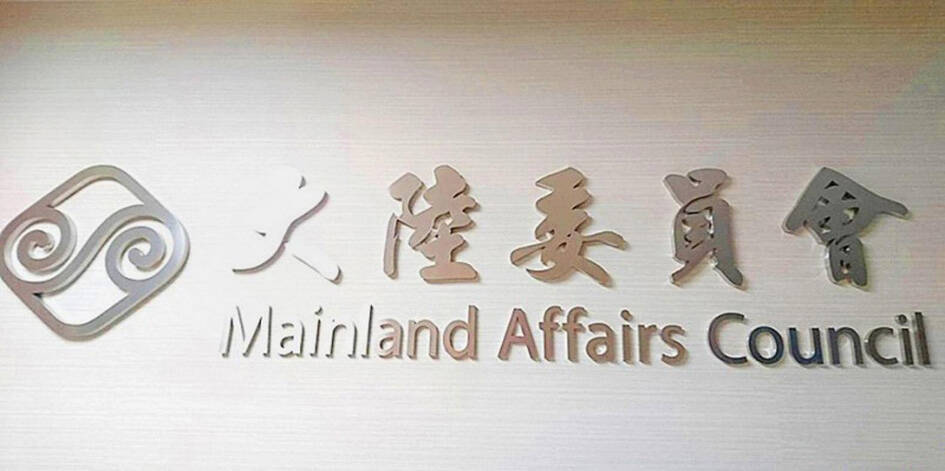Preservation of combat capabilities and air denial strategy are key countermeasures Taiwan can take against China’s military unification agenda, a report commissioned by the Mainland Affairs Council (MAC) said.
For the Chinese Communist Party (CCP) to successfully unify with Taiwan by force, it has to first ensure air supremacy, then impose a blockade to deny foreign assistance and finally initiate a landing operation to occupy Taiwan, the report said.
To counter the CCP, Taiwan has to preserve its combat capabilities and leverage asymmetric warfare strategy, it said.

Photo: Chung Li-hua, Taipei Times
The report found that Beijing is pursuing both “peaceful unification” and “unification by force” strategies, which would lead to an increase in Taiwan’s geopolitical risks and national security threats in the short to medium term.
The CCP’s use of intimidation and local attacks as military tactics would cause the collapse of the nation’s power, communication and medical systems, which might determine the outcome of the conflict, it said.
Beijing is implementing peaceful unification tactics to win over Taiwanese, such as through providing opportunities for Taiwanese youth to study and work in China, exchanging views with local mayors and lifting bans on agricultural products, it said.
It also pushes for peaceful unification by extending economic benefits to Taiwanese businesses and introducing other preferential policies, it said.
The biggest obstacle of the strategy lies in the differences between Taiwan and China’s political systems and trust in government institutions, it said, adding that Hong Kong’s “one country, two systems” is a bad example.
As for the “unification by force” strategy, China might face challenges such as sluggish economic growth and national development issues, the report said.
Other challenges include the military risks in crossing the Taiwan Strait, resistance from Taiwanese people, as well as international opposition as the anti-China alliance is growing stronger, it said.
The increasingly severe economic and social challenges might prompt China to turn to military actions in the hope of drawing attention away from its domestic issues, it said.
The possibility of Chinese President Xi Jinping (習近平) trying to consolidate his leadership by taking military actions to unify with Taiwan by 2027 is not to be underestimated, it said.
Achieving the “unification of the motherland” is conducive to enhancing Xi’s authority and legitimacy in the CCP, it said.
Beijing’s political differences with Taiwan and its tensions with the US are difficult to resolve, so it might use of unification to achieve its aim, the report said.
The government should raise Taiwanese people’s awareness of the CCP’s intention to unify with Taiwan by force, as well as how to be well-prepared to respond to the crisis, it said.
In response to the CCP’s peaceful and military tactics, the government should bolster regulatory, mental, strategic and military preparedness, it said.
The first wave of attacks would be fierce, so Taiwan should improve its defense and asymmetric capabilities, it said.
The national defense strategy should take diplomatic, economic and tactical elements into consideration, it said, adding that the armed forces should familiarize themselves with the battlefield and build multilayered deterrence capability.

Chinese spouse and influencer Guan Guan’s (關關) residency permit has been revoked for repeatedly posting pro-China videos that threaten national security, the National Immigration Agency confirmed today. Guan Guan has said many controversial statements in her videos posted to Douyin (抖音), including “the red flag will soon be painted all over Taiwan” and “Taiwan is an inseparable part of China,” and expressing hope for expedited reunification. The agency last year received multiple reports alleging that Guan Guan had advocated for armed reunification. After verifying the reports, the agency last month issued a notice requiring her to appear and explain her actions. Guan

GIVE AND TAKE: Blood demand continues to rise each year, while fewer young donors are available due to the nation’s falling birthrate, a doctor said Blood donors can redeem points earned from donations to obtain limited edition Formosan black bear travel mugs, the Kaohsiung Blood Center said yesterday, as it announced a goal of stocking 20,000 units of blood prior to the Lunar New Year. The last month of the lunar year is National Blood Donation Month, when local centers seek to stockpile blood for use during the Lunar New Year holiday. The blood demand in southern Taiwan — including Tainan and Kaohsiung, as well as Chiayi, Pingtung, Penghu and Taitung counties — is about 2,000 units per day, the center said. The donation campaign aims to boost

The Kaohsiung Tourism Bureau audited six hotels in an effort to prevent price gouging ahead of Korean band BTS’ concert tour in the city scheduled for Nov. 19, 21 and 22 this year. The bureau on Friday said that the audits — conducted in response to allegations of unfair pricing posted on social media — found no wrongdoing. These establishments included the local branches of Chateau de Chine, Hotel Nikko, My Humble House, and Grand Hai Lai, it said, adding that the Consumer Protection Commission would have penalized price gougers had the accusations been substantiated. The bureau said the Tourism Development Act

BACK TO WINTER: A strong continental cold air mass would move south on Tuesday next week, bringing colder temperatures to northern and central Taiwan A tropical depression east of the Philippines could soon be upgraded to be the first tropical storm of this year, the Central Weather Administration (CWA) said yesterday, adding that the next cold air mass is forecast to arrive on Monday next week. CWA forecaster Cheng Jie-ren (鄭傑仁) said the first tropical depression of this year is over waters east of the Philippines, about 1,867km southeast of Oluanpi (鵝鑾鼻), and could strengthen into Tropical Storm Nokaen by early today. The system is moving slowly from northwest to north, and is expected to remain east of the Philippines with little chance of affecting Taiwan,